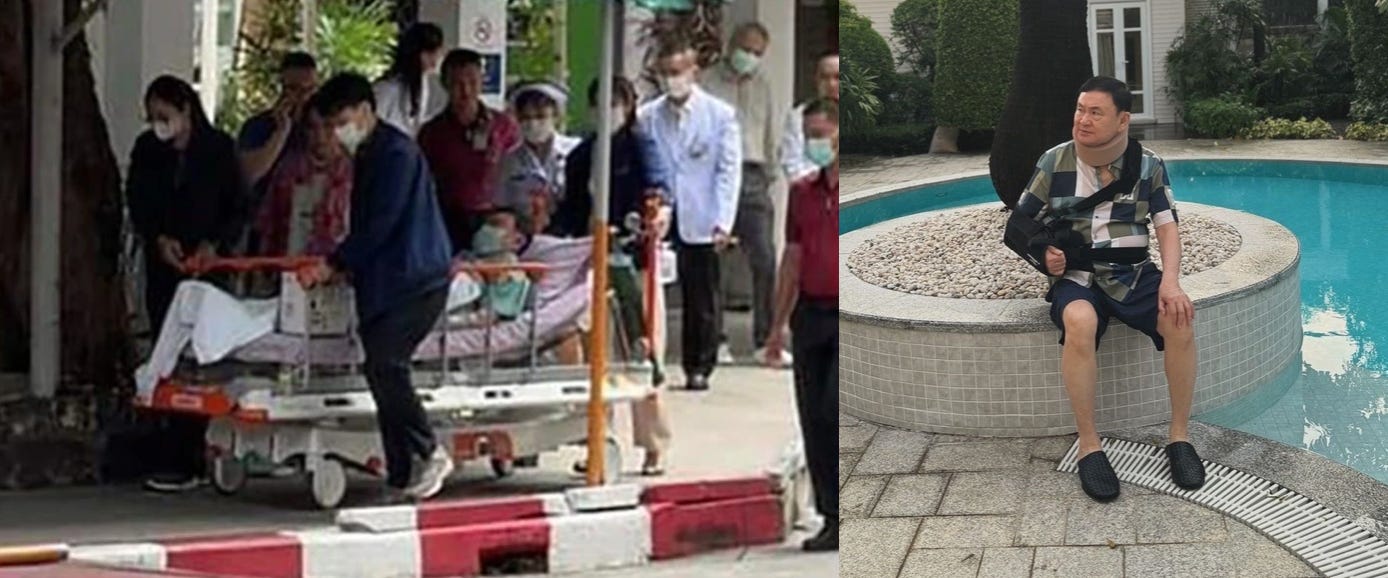What Happened on the 14th Floor?
Officials are asked to explain the unexplainable

It’s been an exceptionally busy stretch for me recently, but that has wrapped up and we will soon be returning to a more regular posting schedule here at The Coffee Parliament. Today I wanted to take a closer look at some recent developments on the furor surrounding Thaksin Shinawatra’s hospitalization.
Given that it has now been two years, the events surrounding Thaksin’s return to Thailand in 2023 are worth a recap. Thaksin had been removed as prime minister by a military coup in 2006 and had been living in self-imposed exile in Dubai since 2008, owing to a series of prison sentences handed to him by the courts. In the lead-up to the 2023 general election, Thaksin often referenced his hope to return to Thailand soon — although this was not always taken seriously given he had made similar remarks over the years — and many thought it would have been called off when he postponed his return ostensibly due to a need for a health checkup.
Yet Thaksin’s plane did land in Thailand on August 22nd. The former prime minister emerged from the plane looking perfectly healthy, before he was taken into custody and sent to prison. But that night, the Department of Corrections said that Thaksin began to develop chest tightness, high blood pressure, and low oxygen levels. He was moved by helicopter to the Bangkok Police General Hospital. Doctors then diagnosed him of “four co-morbidities: Ischemia, a severe lung infection, hypertension, and degenerative spine and herniated discs.”
Thus Thaksin’s extended hospital stay on the 14th floor of the Police General Hospital began. He was seen being wheeled in a hospital bed. Questions were raised over why Thaksin was staying on that floor, which was said to house the hospital’s VIP suite. (The hospital claimed that it was not such a suite, and that not even the air conditioner in the room was working, but later on a parliamentary committee was told that Thaksin paid for all the expenses of staying in the VIP suite ). He ended up spending six months in the hospital, before being granted a royal pardon and released on parole. The former prime minister emerged wearing a neck brace and an arm sling; former defence minister Suthin Klansang argued that Thaksin’s bones were “genuinely broken,” and the Pheu Thai Party claimed Thaksin had both a form of degenerative disease and a tendon disorder.

Should the health saga be true, Thaksin’s recovery will have be studied: sight of the former prime minister golfing, frequently giving speeches, campaigning for Pheu Thai candidates, and even taking the time to serve as an advisor to Malaysian Prime Minister Anwar Ibrahim demonstrates a remarkably full recovery. One can be forgiven for feeling a little incredulous about this entire turn of events — Thaksin appeared perfectly healthy (and had just gotten a health checkup!) prior to being taken into prison and seems to have made an immediate full recovery after being paroled. (For his part, Thaksin credits his health comeback to his better mental health after being allowed to live at home).
Now, however, events are catching up to Thaksin. Firstly, the Medical Council of Thailand has now voted to suspend the medical licenses of two doctors involved in Thaksin’s case and issued a formal warning to another. The Medical Council Vice President, Dr Prasit Watanapa, cautioned the public against using these rulings to make a determination on whether Thaksin was genuinely ill, but noted that there was insufficient evidence to demonstrate that Thaksin was in critical condition and the referral notice to the Police General Hospital did not meet professional medical standards. The Minister of Public Health, Somsak Thepsuthin, will have to approve these actions. Somsak is thus caught in a very awkward position: as the Isara News Agency says, “if Somsak is so dedicated to helping out ‘the boss’ without caring about what society thinks, he could veto the resolution.” But even such a veto would only send the matter back to the Council, which can override the veto with a two-thirds majority.
Even more worrying for Thaksin and the government, the Supreme Court has also scheduled an investigation into whether or not Thaksin’s illnesses were genuine while he was staying in the Police General Hospital. (The Supreme Court dismissed an earlier petition on this matter by arguing the petitioner did not have standing, but has now taken this case up independently). This investigation could also prove toxic for Thaksin. Several relevant officials, such as those at the prison, the Department of Corrections, and the Police General Hospital have now been asked to submit evidence to the Court. As columnist Jitakorn Busaba explained, a determination will have to be made on whether Thaksin met the legal standard of requiring external hospitalization and could not be taken care of at the Department of Corrections Hospital.
While the full political ramifications of the ramped-up scrutiny over Thaksin’s hospital stay will take time to show, it has already forced Thaksin and Pheu Thai into an uncomfortable position and provided their conservative “allies” with even more bargaining power. As The Nation argues, “Previously, rumours swirled that Thaksin had directed his daughter, Prime Minister Paetongtarn Shinawatra, to initiate a Cabinet reshuffle. This sparked a flurry of behind-the-scenes deal-making, as political heavyweights — both in the spotlight and in the shadows — scrambled to secure or switch ministerial posts…However, the legal proceedings over Thaksin’s hospital stay have forced him to pause his aggressive political plays and shift into a more defensive posture.”
Yet one also wonders whether or not overtly aggressive action in investigating Thaksin’s 14th floor stay and forcing him to explain the unexplainable hews too close to accidentally forcing an end to the grand compromise. An unfavorable finding to Thaksin could force him back to prison. It could also bring down the entire government, as many officials — including Thaksin’s daughter Prime Minister Paetongtarn Shinawatra — have staked their credibility to insist that Thaksin was genuinely ill. Even as the government muddles along, the walls continue to close on Thaksin and his party.
Some other recent work from me:
A few weeks ago I was on the CSIS Southeast Asia Radio podcast to discuss the current state of Thai politics.
My ISEAS Perspective piece (co-authored with Napon Jatusripitak) on voter profiles in Thai politics has been re-packaged as a long-read on Fulcrum.



I’m a guest in this country and hesitate to comment but it seems to me that Anuthin is the best politician in the current Government. If I were Thai and wished to see a continuation of conservative government I’d rally to his flag.
Bhumjaithai's senators are in danger of being dismissed for fixed voting whilst Pheu Thai face possible dismissal and punishment for its leader and proxy PM.
Could it be the elite have had enough of Thaksin, his aggressive promotion of the casinos and his arrogance towards coalition partners?
Is it time for Anuthin to assume the premiership?
But how can Bhumjaithai win enough votes if the coalition is truly ruptured?
Perhaps it will all blow over with just slapped wrists all round and Thaksin conceding the premiership to Anuthin as the price for his hubris and arrogance.
After all, anything is better than exile or prison